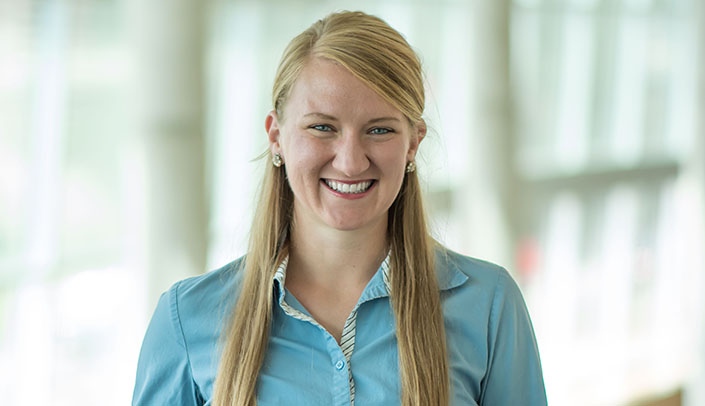When Annie Woodruff Jameson, D.P.T., was working in direct support, she couldn’t help but notice that transportation — and barriers to it — had a huge impact on the lives of the people with disabilities that she was helping.
Although Dr. Woodruff Jameson hasn’t worked in direct support for five years, those barriers remain. Now, through her work with the MMI University Center for Excellence in Developmental Disabilities, she’s working to help address them – in Omaha, and then hopefully in Nebraska at large.
Dr. Woodruff Jameson is now attending meetings of the Metropolitan Area Planning Agency coordinated transit committee and other community organizations to bring the UCEDD’s message of inclusive transportation to city leaders and connect with the players in the city’s transportation infrastructure. Her efforts are part of a push by the UCEDD to address travel issues confronting people with intellectual and development disabilities in the Omaha area.
The main funding source for the transit committee, Dr. Woodruff Jameson said, is a federal grant for serving people with disabilities and the elderly as a part of Omaha’s public transit system.
“They disseminate that to different agencies what can run their own transportation services, and people do the best they can with what they have to service the population they are targeted to serve,” she said. “But it’s very fragmented, and not by disability. For example, the Eastern Nebraska Office on Aging serves people who are west of 120th street, so they don’t have access to the public transportation system. There’s a separate service for Council Bluffs and a separate service for Papillion. So it’s all of these different agencies serving nearby areas.”
MMI and the UCEDD are looking to be part of the discussion, said Wayne Stuberg, Ph.D., director of the UCEDD and associate director of MMI.
“Working with people with special health care needs and having an understanding of what the needs are, we want to see how we might enhance our systems for increasing people’s mobility to be members of the community, both here locally and across the state.”
“We want to raise awareness, so when people are making these plans, they consider people with disabilities,” Dr. Woodruff Jameson said. “MAPA’s coordinated transit committee is pretty aware of all those issues — they’re aware of the challenges.
“But there also are a lot of other community organizations, like ModeShift, an organization looking at alternative forms of transit,” she said. “When they are advocating, they may not be seeing things through a disability lens.”
People with disabilities and the elderly are potentially going to use public transportation the most.
“For a lot of people, it’s not a choice, but a lot of times those people are not represented in movements like this,” she said.
A needs assessment done for the state’s Council on Developmental Disabilities showed transportation for individuals with special health care needs as one of the top three areas of most concern and needing improvement, said Dr. Stuberg, who is a member of the council.
“It affects integration into the community,” he said. “It affects employment. It affects being able to be a person who is fully participating in society, including recreation, leisure and employment
“Many cities — and Omaha is one of them, as well as the rural parts of the state — do not have a very well-developed public transportation system,” he said. “The cost of using cabs and other services is high, and if you have special mobility needs, you may not be able to utilize those forms of transportation. So you’re looking at having a specialty carrier to perform those services, and they’re very cost-prohibitive.”
In direct support, Dr. Woodruff-Jameson saw examples of this every day, she said.
“Transportation affects access to the community,” she said. “That can result in a lot of loneliness if you’re not able to participate socially, as well as a lot of inactivity.
“As a physical therapist, that is something that I see a lot of. As an advocate, that is something I want to change.”

I am so glad to see this being addressed. I have a daughter with fetal alcohol syndrome who is not able obtain a driver's license as she has difficult deciphering sentences in testing situations. She has held a full time job at a grocery store for the past six years and has been able to get off all assistance programs. The remaining barrier for us is transportation. We live out west near 150th and Maple and there is nothing out there for public transportation. We would be willing to pay for MOBY and other types of service to help her gain more independence, but it is not available. I have an older son who has cerebral palsy and a heart condition. We were told that we would have to take him to a business address and leave him there for pick up and drop off. It was not worth the risk, so he is sitting home doing nothing when he is very able to do meaningful work.